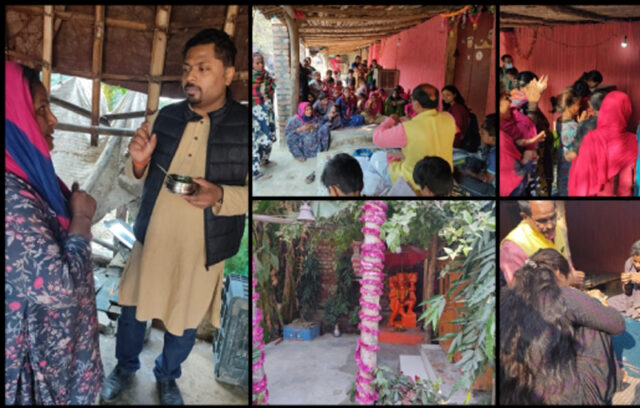
-Ganesh Puthur
The condition of Hindus in Muslim majority nations like Pakistan, Afghanistan and Bangladesh was at the centre stage of discussions and debates that took place in the aftermath of the Union government bringing the Citizenship Amendment Bill. Hindus are subjected to widespread persecution in these nations. Their temples are desecrated routinely by the Islamists, women are abducted, raped and forcefully converted; forcing them to flee their land. In Pakistan, the majority of Hindus live in the Sindh province, the citadel of the world’s most ancient civilisation. Many have fled the Sindh province with their dear ones to reach India; to live a peaceful life where they won’t be treated as second-grade citizens.
In Delhi, Seva Bharati has identified seven such colonies where Pakistani Hindu refugees live and have launched many schemes for the betterment of their lives. These ‘Seva Bastis’ are located in Bijwasan, Bhati Mines, Majnu-ki-Tilla, Signature bridge, Adarsh Nagar, Rohini Sector-11 and Rohini Sector-25. There are around 43,000 Pakistani Hindu refugees living in these camps. Seva Bharati has launched initiatives like giving education to the kids, starting stitching centres for women, helping men to their own business and spreading social awareness.
I joined the Seva Bharati team at Rohini Sector-11, since they were visiting a Pak Hindu Basti to train them to make decorative lights. Kundan Kanskar, who is the State executive member of Seva Bharati and Head of the Hindu Refugee Service Project, elaborated about the works done by Seva Bharati to uplift the Hindu refugees in Delhi.
“Migrants who came from 2013 are settled in the Basti of Rohini Sector-11”, Kundan said. “Every refugee has a shocking story of religious discrimination to tell”. “The primary objective of today’s visit is to team them to make decorative lights”, he said, pointing at the bulbs and other raw materials that he had brought along with him.
A Seva Bharati volunteer from Indore, Vinod Mohan, was the tutor for the day and he was helped by another volunteer named Anju Pandey. Around 30 women who expressed their interest to learn were divided to three groups and were given training. After a few hours, when the lights were operational, I could see the joy in their eyes. The lights were used to decorate the Hanuman temple in the Basti.
The Seva Bharati volunteers visited many houses within the Basti, enquiring about their medical issues and checking whether the families have sufficient storage of food grains. Their love and affection for Seva Bharati were visible since many of the households praised the volunteers for their selfless service. But, some of the families are still struggling to get Aadhar cards and other documents to prove their Indian nationality.
“We also focus on spreading social awareness regarding hygiene, family planning, the importance of financial stability and education among the members of this community”, said Anju Pandey, a Seva Bharati volunteer and a journalist by profession. “It is very important to fully integrate them into the Indian society and it is a time-consuming process,” she added.
When the refugee Hindu community was struggling during the COVID related lockdowns, Seva Bharati volunteers ensured a regular supply of food grains to them. Ambulance services were also made available to the community members at the time of emergency when no other mode of transportation was available.
With the persecution Hindus and facing in Pakistan, more members of the Hindu community are expected to migrate to India and many of them might eventually be settling in Delhi. “Seva Bharati is scaling up its activities,” Kundan said and added, “we are planning schemes that will have a larger impact on the lives of Hindu refugees”.
The selfless service of Seva Bharati volunteers is helping the refugee Hindu community to survive in India. This is also saving the community from those evil forces who are trying to penetrate to any gap to exploit a community’s poverty and convert them with rice bags! The Pakistan Hindu community have suffered a lot, but they have kept their Dharma intact. This spirit of Dharma is what kept the culture alive throughout the tough times of the Medieval and Model periods.
Courtesy : VSK BHARATH














